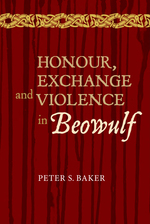Peter S. Baker, Honour, Exchange and Violence in ‘Beowulf’. Anglo-Saxon Studies 20. Cambridge: Brewer, 2013. x + 279 pp. Hardback. 9-7818-4384-3467. £60.
As Peter Baker observes in his opening sentence, ‘There’s no getting around the
fact that Beowulf is violent’. Within heroic poetry we interpret this violence with
reference to a framework of values concerned with the calibration of honour.
We know, of course, that honour is not invariably expressed through violence:
several other forms of reciprocal exchange come into play, most notably gift-giving,
which is subtle in the messages it conveys and the social conditions that it (often
temporarily) establishes. Such ideas inform any critical discussion of Beowulf. From the
title of Baker’s book one might think that this is yet another fairly predictable analysis
of these concepts — perhaps more clearly expressed than in some studies, since Baker
is a clear thinker and lucid writer, but maybe not taking us much beyond the
familiar. Yet such an assumption would be wrong. This is a stimulating book, which
provides new and challenging insights into the world of what Baker appropriately calls
the ‘honour economy’.
In exploring this economy, Baker makes use of modern anthropological and sociological
studies, but he does so judiciously and with great sensitivity, recognising from the
outset that there is no easy read-across. Rather, he allows this reading to sharpen his
ability to read Beowulf with greater penetration, testing his insights, in the end,
not so much by reference to the modern studies as by reference to other medieval
literatures which also deal in the economy of honour. One valuable outcome is ‘to
claim a place of importance for Beowulf in the ongoing scholarly discussion of violence
in the literature of the Middle Ages’ (p. 240), a context for reading the poem that is
all too rarely deployed. The most significant outcome of his approach, however, is that
the elements making up the ‘honour economy’ are given nuanced definitions
that are more culturally and linguistically sensitive than the familiar frames of
reference that have become entrenched in modern scholarship.
This, it must be emphasised once again, is not a book which uses modern sociological
studies in a crass way. Far from it. Baker is very alert to the language of Beowulf and
other texts to which he refers, and he offers well-researched analyses of words and
phrases which lie at the heart of this value-system. Taking advantage of the resources
now available, he repeatedly shows that the interpretations of earlier scholars are open
to question, and that more subtle or more precise definitions lead to reassessments of
how we read and interpret. The focal points for analysis are those that one might
expect: the role of plunder throughout the poem, the interpretation of Unferth’s verbal
exchange, the loan of his sword to Beowulf and its return, the complexities of the
Finnsburg Episode, the role of Wealhtheow, of Freawaru, and of the ‘peace-weaver’
figure more generally (a term that is itself importantly reinterpreted) and the meaning
within the honour economy of Beowulf’s last fight and its outcome. These are the
familiar episodes to which we return again and again in our reading and teaching of
Beowulf, but I suggest that our reading and teaching will both be reinvigorated by
Baker’s analysis. He presents a lucid argument in an accessible style and bases
his interpretations on a depth of research which he wears lightly. This is a book that
will benefit all readers of Beowulf, students and established scholars alike.
Joyce Hill
University of Leeds

